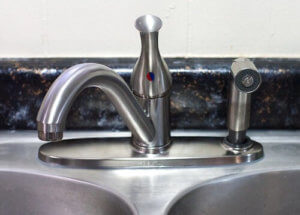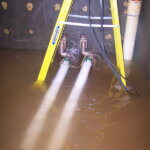Five Signs That You Have a Major Plumbing Problem at Home
Until there’s a problem, most people don’t focus much on their plumbing. Unfortunately, an issue with this essential system could cause extensive damage to your home and keep you from taking care of routine tasks such as showering. If you don’t contact a plumber when needed or make repairs yourself, even a small issue could become costly and inconvenient. Watch out for these common signs that you could have an urgent plumbing problem.
Stains and Bad Smells
Water leaks can lead to stains on your walls, ceilings, or floors and a musty or earthy smell. If the stain is green or black, it comes from mold growth. A light brown or beige color usually means the damage is more recent. If the stain is on your ceiling, you could have a leak in your roof rather than a problem with your plumbing. Similarly, a stain in an apartment or condo could be from the plumbing in the unit above you.
Pipes run throughout your home, so you could notice water damage in a hallway near a bathroom or kitchen before any issues are noticeable near your actual plumbing fixtures. Cracked and mildewed caulk or grout could signal a leak as well.
You should replace or repair any damaged materials as soon as possible to prevent harmful mold and mildew. Along with bad smells, mold can lead to asthma or allergy symptoms, headaches, eye irritation, rashes, fatigue, and other health issues. Correct mold and repair water damage as soon as possible. Make sure you take the appropriate safety precautions if your home contains mycotoxins, which are secondary metabolites that are produced by microfungi and can cause sickness and death in people and pets.
If your sink is smelly, you could have a clogged drain with bacteria growing in it, or the water in the p-trap could have evaporated. The p-trap is the curved part of the pipe under your sink, and it holds water to keep your drain from emitting bad smells. If you don’t use your sink, and the water evaporates, you could start to notice an unpleasant scent. Pour some hot water down your sink to kill bacteria and restore the water in the p-trap. See if your garbage disposal needs cleaning as well.
If you still notice a bad smell, contact a plumber. You could have a broken seal around your toilet. Fortunately, repairing the seal or replacing your toilet is simple. However, you could have a leak in your home’s sewer line caused by extensive damage from tree roots or other hazards.
Strange Noises
Apart from the sounds of running water when someone washes their hands or takes a shower, your pipes should be pretty quiet. If you hear water when no one is using water, your toilet could have a broken valve, or you could have a hidden leak. If you hear gurgling noises coming from your drains when you flush your toilet or use your sink, you could have a problem with your plumbing’s ventilation system. This system prevents gurgling by letting air replace water and vice versa at smooth rates. A clogged drain or a sewer backup can cause gurgling as well.
Banging or clanging noises when you turn the water on or off are signs of high water pressure. You should get a professional to adjust it before a leak forms.
A banging or rumbling noise coming from your water heater is usually caused by sediment that builds up over time. It can make your water heater less efficient and cause unpleasant smells. The additional minerals also take up space in the tank, so you’ll run out of hot water faster. With minor cases of corrosion, you can get the tank drained. However, you’ll need a new water heater for more severe cases.
Discolored Water
If your water is discolored or tastes strange, you likely have old pipes that need replacing before leaks form. Air inside your pipes can cause cloudy water with lots of bubbles, and rusty pipes can make your water brown, reddish, or yellow. If only your hot water is discolored, you probably need to have your water heater checked. If you have corroded copper pipes, your water could look green. A new municipal water source could cause discoloration as well.
If your home has hard water, or water with a high mineral content, the water could taste slightly bitter. An earthy or musty flavor could be from algae in untreated or improperly treated water, and a chemical scent could be from additives introduced during water treatment. Corroded pipes will make your water taste metallic. You can remove many of these unpleasant tastes with a water filter.
Low Water Pressure

Image via Flickr under CC BY 2.0 by cogdogblog
If just one of your fixtures has low water pressure, the problem is likely with that faucet or the pipes serving it. You might be able to correct the issue by cleaning or replacing the faucet aerator. If that doesn’t do the trick, you could replace the faucet. If the water pressure is low in your entire home, your water pressure regulator may be broken. The valve controlling your home’s water supply could be partially closed as well.
You could also be placing too much demand on your neighborhood’s water supply. For example, you might not be able to maintain water pressure if you wash dishes, do laundry, and take a shower at the same time.
High Utility Bills
If your water bills are increasing but you’re not using more water than normal, you could have a hidden leak wasting water inside or around your home. Look for water damage, wet spots in your yard, or a patch of grass that’s greener than the vegetation around it, and get repairs as soon as possible. If your electricity bills are rising as well, you could have a problem with your water heater that’s reducing its efficiency. You may also notice that you need to wait longer for hot water and that it runs out faster.
Can you think of any common signs of plumbing problems that we missed? What happened last time you dealt with a plumbing issue? Contact us and let us know your experiences and concerns. We can help you choose a variety of plumbing components.


